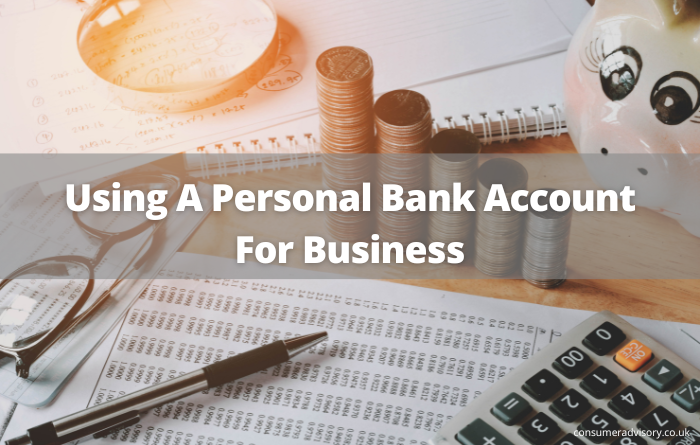
If you’re running a small business, you might be wondering if you can use a personal bank account for business purposes. The answer is yes, you can – providing you are trading as a sole trader. However, there are some things you need to know first.
One of the most important things to note is that many banks and building societies have a clause in their terms and conditions that state that you cannot use your personal account for business use. If you are caught breaking the terms and conditions, you risk having your bank account closed down.
Despite this, there is no legal reason why you can’t use your personal account for business, providing you are trading as a sole trader.
In this article, we will tell you everything you need to know about using a personal bank account for your business, including when you can legally do this and the pros and cons of choosing this method of business banking.
Can You Use A Personal Bank Account For Your Business?
The quick answer is yes, but there are conditions. You can use a personal bank account for business purposes providing you are a sole trader with no employees.
If you are a limited company or have employees, then you must have a business bank account set up as it is illegal to mix personal and business finances.
There are several reasons for this, including the fact that it can make it very difficult to work out your business’s tax liability come self-assessment time.
Another key reason is that it will help you to manage your finances more effectively and give you a clear idea of how much money your business is making (or losing).
Finally, if you ever need to apply for a business loan or other type of finance, most lenders will require you to have a business bank account set up.
So, if you are a sole trader with no employees, you can use your personal bank account for your business.
Pros and Cons Of Using A Personal Bank Account For Your Business
There are a few pros and cons to consider before using your personal account for business.
Pros:
- Easier to set up
- Better interest rates
- Only one account to manage
- Lower fees
Cons:
- Bank account could be closed
- More difficult to get a business loan
- Difficult to keep track of business transactions
So, those are a few things to consider before using your personal account for business use. Let’s take a look at the benefits and risks of using a personal bank account for business in more detail.
Benefits Of Using A Personal Account For Your Business
There are many benefits of using a personal bank account for your business, which is why many small businesses choose this method. In this section, we’ll take a closer look at some of these benefits.
Easier To Set Up
One of the main benefits of using a personal bank account for your business is that it’s much easier to set up than a business bank account.
This is because you won’t need to provide as much documentation, and in some cases, you may not need any documentation at all.
Better Interest Rates
Another benefit of using a personal account for business is that you may be able to get a better interest rate.
This is because personal accounts often have better interest rates than business accounts.
However, it’s important to compare the interest rates of different banks before opening an account, as they can vary greatly.
Only One Account To Manage
Another advantage of using a personal bank account for business is that you’ll only have one account to manage.
This can be helpful if you’re not used to managing multiple accounts, as it can be difficult to keep track of them all.
Lower Fees
Finally, another benefit of using a personal bank account for business is that you may be able to avoid some of the fees associated with business banking.
For example, many banks will charge you a monthly fee for having a business bank account, but this is usually not the case with personal accounts.
Risks Of Using A Personal Bank Account For A Business
Despite the benefits, there are also some risks to consider before using a personal bank account for your business. In this section, we’ll take a look at some of these risks in more detail.
Your Bank Account Could Be Closed
One of the risks of using a personal account for business is that your bank could close your account at any time.
This is because banks generally don’t like it when their customers use personal accounts for business purposes.
If your bank does find out that you’re using your account for business, they could close it without notice.
This could leave you in a difficult situation, as you may not be able to open another account with that bank.
It’s also worth noting that if your bank account is closed, you may not be able to get your money back.
More Difficult To Get A Business Loan
Another risk of using a personal bank account for business is that it may be more difficult to get a business loan or a business credit card.
This is because most lenders will require you to have a dedicated business bank account set up before they’ll give you a loan.
If you don’t have a business bank account, you may find it difficult to get the financing you need for your business.
Difficult To Keep Track Of Business Transactions
Finally, another risk of using a personal account for business is that it can be difficult to keep track of your business transactions, including your business income and expenses.
This is because you’ll have to keep track of both your personal and business transactions in one account. This could lead to mistakes being made when it comes to filing your annual tax returns.
So, those are a few things to consider before using your personal bank account for business use. Overall, there are both benefits and risks to using this method, so it’s important to weigh up your options carefully before deciding what’s best for your business.

Benefits Of Using A Business Bank Account
Despite the risks, there are also some benefits to using a business bank account for your business. In this section, we’ll take a look at some of these benefits in more detail.
Separates Personal And Business Finances
One of the main benefits of using a business bank account is that it allows you to separate your personal and business finances.
This can be helpful as it makes it easier to track your business expenses and income. It also means that you won’t have to worry about mixing up your personal and business finances.
Makes Record Keeping Easier
Another benefit of using a business bank account is that it makes record keeping easier.
This is because all of your business transactions will be in one place, which makes it easier to track and manage them.
Makes Tax Returns Easier To Complete
Another benefit of using a business bank account is that it can make your annual tax return easier to complete.
This is because you’ll have all of your business transactions in one place, which will make it easier to calculate your tax liability.
Allows You To Apply For A Business Loan
As we mentioned earlier, one of the risks of using a personal bank account for business is that it may be more difficult to get a business loan.
However, if you have a business bank account, you’ll have an easier time applying for a loan.
This is because most lenders will require you to have a business bank account before they’ll give you a loan.
Business bank account vs personal account for sole traders
The debate of whether to use a personal or business bank account as a sole trader is one that has existed for many years. While there are benefits and risks associated with both options, it ultimately comes down to your personal preference.
If you’re considering using a personal account for business purposes, it’s important to weigh up the pros and cons carefully before making a decision.
You should also speak to your accountant or financial advisor to get their professional opinion on which option would be best for your business.
Do I Need To Open A Business Account For My Limited Company?
If you’re a limited company, you must have a business bank account. This is because your limited company is a separate legal entity to you, so it needs its own bank account.
You can’t use your personal bank for business purposes if you’re a limited company. This is because it’s illegal and could lead to serious consequences.
If you’re caught using your personal bank account for business purposes, you could be fined or even sent to prison.
So, if you’re a limited company, make sure you open a business bank account as soon as possible.
Do I Need To Open A Business Bank Account If I’m Self Employed?
If you’re self-employed, you don’t have to open a business bank account. However, there are some benefits to doing so.
As we mentioned earlier, one of the benefits of using a business bank account is that it can make your annual tax return easier to complete.
Another benefit is that it can help you to keep track of your business expenses. This is because all of your business transactions will be in one place, which can make it easier to manage your finances.
If you’re thinking about using a personal account for business purposes, it’s important to weigh up the pros and cons carefully before making a decision. You should also speak to your accountant or financial advisor to get their professional opinion on which option would be best for your business.
How To Open A Business Bank Account?
Opening a business bank account is a fairly straightforward process.
You’ll need to provide some personal and business information, as well as proof of ID. You may also need to provide proof of your business address.
Once you’ve gathered all the required documentation, you can apply for a business bank account online, over the phone, or in person at a bank branch.
It’s important to compare different business bank accounts before you decide which one is right for your business. This is because there can be significant differences in the fees and features offered by different banks.
In Summary
When you’re running a business, it can be difficult to know how best to manage your finances. One option is to open a business bank account. Alternatively, you could choose to use your personal bank account for business.
Whichever method you choose, it’s important to weigh up both the pros and cons before making an informed decision.
